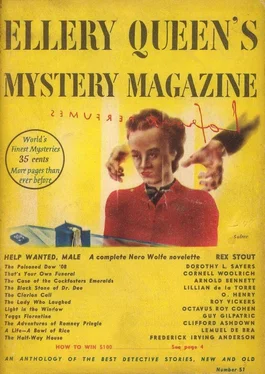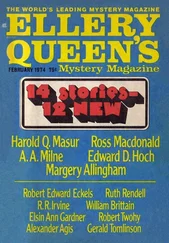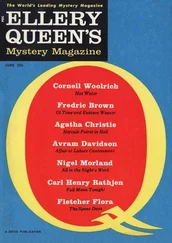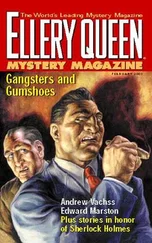Frederick Anderson - Ellery Queen's Mystery Magazine, Vol. 11, No. 51, February 1948
Здесь есть возможность читать онлайн «Frederick Anderson - Ellery Queen's Mystery Magazine, Vol. 11, No. 51, February 1948» весь текст электронной книги совершенно бесплатно (целиком полную версию без сокращений). В некоторых случаях можно слушать аудио, скачать через торрент в формате fb2 и присутствует краткое содержание. Город: New York, Год выпуска: 1948, Издательство: The American Mercury, Жанр: Классический детектив, на английском языке. Описание произведения, (предисловие) а так же отзывы посетителей доступны на портале библиотеки ЛибКат.
- Название:Ellery Queen's Mystery Magazine, Vol. 11, No. 51, February 1948
- Автор:
- Издательство:The American Mercury
- Жанр:
- Год:1948
- Город:New York
- ISBN:нет данных
- Рейтинг книги:3 / 5. Голосов: 1
-
Избранное:Добавить в избранное
- Отзывы:
-
Ваша оценка:
- 60
- 1
- 2
- 3
- 4
- 5
Ellery Queen's Mystery Magazine, Vol. 11, No. 51, February 1948: краткое содержание, описание и аннотация
Предлагаем к чтению аннотацию, описание, краткое содержание или предисловие (зависит от того, что написал сам автор книги «Ellery Queen's Mystery Magazine, Vol. 11, No. 51, February 1948»). Если вы не нашли необходимую информацию о книге — напишите в комментариях, мы постараемся отыскать её.
Ellery Queen's Mystery Magazine, Vol. 11, No. 51, February 1948 — читать онлайн бесплатно полную книгу (весь текст) целиком
Ниже представлен текст книги, разбитый по страницам. Система сохранения места последней прочитанной страницы, позволяет с удобством читать онлайн бесплатно книгу «Ellery Queen's Mystery Magazine, Vol. 11, No. 51, February 1948», без необходимости каждый раз заново искать на чём Вы остановились. Поставьте закладку, и сможете в любой момент перейти на страницу, на которой закончили чтение.
Интервал:
Закладка:
Ellery Queen’s Mystery Magazine, Vol. 11, No. 51, February 1948

Help wanted, male
by Rex Stout [1] Copyright 1945, by Rex Stout
One of the brightest observations ever wade about Rex Stout’s work in the detective field, and seemingly one of the most penetrating ever advanced by an American critic, is credited to Howard Haycraft. Speaking of Nero Wolfe’s “ paint-fresh assistant,” Archie Goodwin, Mr. Haycraft offers the opinion that Archie is “the one example in history of a Watson who steals the play from his Holmes, and a first-rate Holmes to boot.” Your Editor does not agree. True, Archie Goodwin is something that most Watsons are not: he is a three-dimensional character in his own right and easily in the top rank of clever and engaging “narrators”; but when the shouting is over, Archie remains what he started out to be — the great Nero Wolfe’s stooge. It is Nero Wolfe who is the criminological catalyst; it is Nero Wolfe who pulls the culprit out of the hat; it is the elephantine and elephant-memoried Nero Wolfe who always makes sense out of nonsense; and infinitely more important, it is Nero Wolfe who emerges as the fuller of two three-dimensional characters. Once you have met Nero, you will never forget him — and that is the test.
Consider: Can you ever forget the physical Nero Wolfe? No, the excessively fat man created by Rex Stout is as permanently lodged in your memory as the excessively thin man created by Dashiell Hammett. Can you ever forget the mental Nero Wolfe? No, he is one of our keenest razor-brains — a master manhunter. Can you ever forget the emotional Nero Wolfe? No, his mannerisms, his idiosyncrasies and eccentricities, are such stuff as emotions are made on. But can all this be said of Archie Goodwin? We chuckle at Archie’s breeziness and brashness; we revel in the way Archie slings slang; we have more than a sneaking admiration for his wolfish tactics with the female of the species; but we really do not know Archie Goodwin as well as we know Nero Wolfe — physically, mentally, or emotionally. Archie is the modern, streamlined packaging: he is the quick sales appeal which attracts customers and excites comment — but the real merchandise is inside the package.
Critics of fiction and detectives of fiction have much in common: they both investigate after the fact; they both seek the truth; and they both have a weakness for subtlety. It is so easy not to see the forest for the trees; it is so easy — both for critics and detectives — to overlook the obvious. For example, Harrison Smith makes this perfectly obvious statement in his “The New Detectives” (Good Housekeeping, September 1947): “[ Sherlock Holmes’s ] nearest equivalent in present-day fiction is Rex Stout’s Nero Wolfe, that man of fat, foibles, and egotism who solves the murder while he sits in his armchair, and without whom the best detectives in the New York Police Department are helpless .”
So obvious — yet so true. The personal eccentricities are all there: Nero Wolfe’s orchid-growing and beer-drinking are creative variations on Sherlock Holmes’s violin-playing and cocaine-injecting, which in turn were creative variations on Auguste Dupin’s day-hibernating and night-rambling. The methods? All laid down irrevocably by Edgar Allan Poe, revitalized by Conan Doyle, and perpetuated by Rex Stout. Yes, the original pattern still flourishes — that is the real secret of the detective story and its popularity. The original theme was an imperishable work of art, and we love every modem variation. That is why it is Nero Wolfe the sleuth, not Archie Goodwin the literary device, who has such a firm grip on our affections...
With which we now bring you the first in our new series of detective novelettes, each complete-in-one-issue. Within the next six months we shall bring you another Nero Wolfe novelette, and at that time tell you more about the man behind Nero and Archie — the dynamic, outspoken Rex Stout himself.
He paid us a visit the day he stopped the bullet.
Ben Jensen was a publisher, a politician, and, in my opinion, a dope. I had had a sneaking idea that he would have gone ahead and bought the inside Army dope that Captain Root had offered to sell him if he had been able to figure out a way of using it without any risk of losing a hunk of hide. But he had played it safe and had cooperated with Nero Wolfe like a good little boy. That had been a couple of months before.
Now, early on a Tuesday morning, he phoned to say he wanted to see Wolfe. When I told him that Wolfe would be occupied with the orchids, as usual, until eleven o’clock, he fussed a little and made a date for eleven sharp. He arrived five minutes ahead of time, and I escorted him into the office and invited him to deposit his big, bony frame in the red leather chair.
After he sat down he asked me, “Don’t I remember you? Aren’t you Major Goodwin?”
“Yep.”
“You’re not in uniform.”
“I was just noticing,” I said, “that you need a haircut. At your age, with your gray hair, it looks better trimmed. More distinguished. Shall we continue with the personal remarks?”
There was the clang of Wolfe’s personal elevator out in the hall, and a moment later Wolfe entered, exchanged greetings with the caller and got himself, all of his two hundred and sixty-some pounds lowered into his personal chair behind his desk.
Ben Jensen said, “Something I wanted to show you — got it in the mail this morning,” and took an envelope from his pocket and stood up to hand it across. Wolfe glanced at the envelope, removed a piece of paper from it and glanced at that, and passed them along to me. The envelope was addressed to Ben Jensen, neatly handprinted in ink. The piece of paper had been dipped from something, all four edges, with scissors or a sharp knife, and it had printed on it, not by hand, in large, black type:
Wolfe murmured, “Well, sir?”
“I can tell you,” I put in, “free for nothing, where this came from.” Jensen snapped at me, “You mean who sent it?”
“Oh, no. For that I would charge. It was clipped from an ad for a movie called Meeting at Dawn. The movie of the century. I saw the ad last week in The American Magazine. I suppose it’s in all the magazines. If you could find—”
Wolfe made a noise at me and murmured again at the fidgeting Jensen, “Well, sir?”
“What am I going to do?” Jensen demanded.
“I’m sure I don’t know. Have you any notion who sent it?”
“No. None at all.” Jensen sounded grieved. “Damn it, I don’t like it. It’s not just the usual junk from an anonymous crank. Look at it! It’s direct and to the point. I think someone’s going to try to kill me, and I don’t know who or why or when or how. I suppose tracing it is out of the question, but I want some protection. I want to buy it from you.”
I put up a hand to cover a yawn. I knew there would be nothing doing — no case, no fee, no excitement. In the years I had been living in Nero Wolfe’s house on West 35th Street, acting as goad, prod, lever, irritant, and chief assistant in the detective business, I had heard him tell at least fifty scared people, of all conditions and ages, that if someone had determined to kill them and was going to be stubborn about it he would probably succeed.
On occasion, when the bank balance was doing a dive, he had furnished Gather or Durkin or Panzer or Keems as a bodyguard at a 100 per cent mark-up, but now they were all very busy fighting Japs, and anyhow we had just deposited a five-figure check from a certain client.
Читать дальшеИнтервал:
Закладка:
Похожие книги на «Ellery Queen's Mystery Magazine, Vol. 11, No. 51, February 1948»
Представляем Вашему вниманию похожие книги на «Ellery Queen's Mystery Magazine, Vol. 11, No. 51, February 1948» списком для выбора. Мы отобрали схожую по названию и смыслу литературу в надежде предоставить читателям больше вариантов отыскать новые, интересные, ещё непрочитанные произведения.
Обсуждение, отзывы о книге «Ellery Queen's Mystery Magazine, Vol. 11, No. 51, February 1948» и просто собственные мнения читателей. Оставьте ваши комментарии, напишите, что Вы думаете о произведении, его смысле или главных героях. Укажите что конкретно понравилось, а что нет, и почему Вы так считаете.












